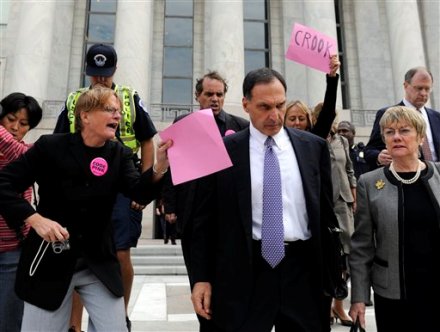A bankruptcy court examiner detailed how Lehman Brothers moved toxic assets off its balance sheet -- then repurchased them. The revelation is putting plenty of heat on the firm's former boss.
An accounting gimmick called Repo 105 provided financial relief for Lehman Brothers in the months before its spectacular collapse, an autopsy of the once-venerable Wall Street house has found. The question now is whether the trickery spells legal jeopardy for executives of Lehman or its auditors Ernst & Young.
The implosion of Lehman Brothers Holdings Inc. into the biggest bankruptcy in U.S. history in September 2008 precipitated the financial meltdown that plunged the economy into the most severe recession since the 1930s. How did it happen?
After saddling itself with tens of billions of troubled assets that couldn't easily be sold, Lehman masked its debt and perilous financial condition by using the accounting artifice, an examiner appointed by the bankruptcy court found in a 2,200-page report on a yearlong investigation.
The examiner, Anton Valukas, discovered that Lehman put together complex transactions that allowed the firm to sell "toxic," mostly mortgage, securities at the end of a quarter — wiping them off its balance sheet when regulators and shareholders were examining it — and then to quickly buy them back. Thus, the "Repo," meaning repurchase.
"It's a very damaging report and certainly is something that is going to be carefully scrutinized by federal prosecutors," said Robert Mintz, a former Justice Department prosecutor who is a private defense attorney.
Now, thanks to the work by Valukas, Repo 105 has entered the pantheon of names of vehicles for accounting chicanery, along with Enron's Jedi, Chewco and Raptor partnerships and the "Buco Nero" (black hole) offshore account stashed away by the fallen Italian dairy giant Parmalat. In the sagas of those two companies, the role of the accounting firms was central.
Did other companies engulfed by the financial meltdown deploy similar accounting tricks?
"I think what Lehman was doing was way out there and quite misleading, and against the financial reporting and accounting rules," said Lynn Turner, a former chief accountant at the Securities and Exchange Commission. "I don't think there were many others, if there were others at all, that were doing this. I think the rules Lehman violated are straightforward."
Even members of Lehman's accounting staff, in e-mails unearthed by the examiner, called the Repo 105 concoctions an "accounting gimmick" and "a lazy way of managing the balance sheet as opposed to legitimately meeting ... targets at quarter end."
In the meltdown's wake, Justice and the SEC launched wide-ranging investigations of companies across the financial services industry, believed to include insurer American International Group Inc. and mortgage giants Fannie Mae and Freddie Mac as well as Lehman. A year and a half after the financial crisis struck, charges haven't yet come in most of the probes.
It's daunting to make a case in a complicated white-collar investigation. "These are often incredibly complicated cases," Mintz said. "Prosecutors need strong and unequivocal evidence of wrongdoing."
In the Lehman affair, though, there's a new road map.
The Justice Department and the SEC "have the benefit of a very substantive and comprehensive investigation," said Peter Haveles, head of the financial services litigation department at law firm Kaye Scholer in New York. "It greatly facilitates the efforts of each of those agencies to evaluate and determine whether to bring charges."
SEC spokesman John Nester declined to comment Friday on the examiner's report.
Valukas's report doesn't reach a conclusion on whether executives violated securities laws. It does say that the executives' decision not to disclose the effects of its business judgments "does give rise to colorable claims against the senior officers who oversaw and certified misleading financial statements."
Colorable claims means there appears to be sufficient evidence to support the awarding of civil damages in a trial.
The executives named by the report include former CEO Richard Fuld and three chief financial officers. Fuld has denied knowing what the transactions were or the accounting for them.
The report says there also are colorable claims against the outside auditors, Ernst & Young, for "its failure to question and challenge improper or inadequate disclosures" in Lehman's financial statements.
Mintz said it's significant that Ernst & Young, according to the examiner, failed to inform the audit committee of Lehman's board of directors of allegations by an Ernst & Young senior vice president of improper accounting at a meeting on June 13, 2008.
"Ernst & Young took no steps to question or challenge the non-disclosure by Lehman of its use of $50 billion of temporary, off-balance sheet transactions," the report says.
In a statement, Ernst & Young says that Lehman thorougly investigated the executive's allegations. In July 2008, Lehman's management reported to the audit committee "and concluded the allegations were unfounded," E&Y spokesman Charlie Perkins said in a statement. "We never concluded our review of the matter, because Lehman went into bankruptcy before we completed our audit."
"Our last audit of the company was for the fiscal year ending Nov. 30, 2007," he said. "Our opinion indicated that Lehman's financial statements for that year were fairly presented in accordance with generally accepted accounting principles and we remain of that view."







